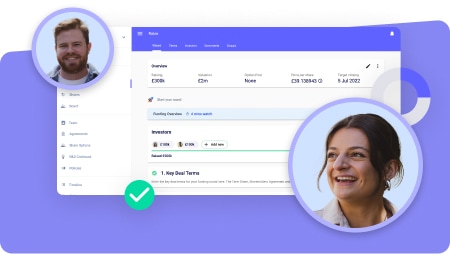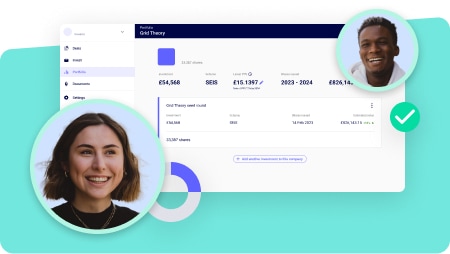Read transcript
Why incorporate in the UK? You are a foreign company. You’re in Estonia, France, Nigeria, wherever. And you are thinking of raising investment and incorporating in the UK.
In this video, I’ll talk about:
- the advantages of the UK
- how to raise investment in the UK
- what to do to transfer shareholding – What if you’ve got safes or CFAs in your business? – What if you’ve got loans or government grants in the business – transferring IP across
I’ll have answers for some things, not for others. In the next few minutes, you should get a good idea of the steps involved in moving your company to the UK, at least to the corporate structure.
Let’s start with why incorporate in the UK? Well, the good news is the UK is insanely business friendly. You can incorporate your company on Companies House for 12 pounds in 30 minutes. It’s all English law with no hated notaries like some European countries have.
You can sign documents electronically online. Everything is set up to make it really easy to run your business.
There are also great tax incentives. For angel investors, they get SEIS and EIS tax breaks, leading to a thriving UK ecosystem.
For investments, investors can tax deduct 50% of their investment from their income tax.
For you as a founder, there is a business relief so for the first million pounds sold you pay only 10% capital gains tax.
You can get back roughly a third of your expenses from the government in R&D tax credits for employees.
There’s the EMI share option scheme with really low taxes – only 10% capital gains tax if kept over 2 years.
And employment law in the UK has the right balance. Some European countries insanely difficult to fire somebody not performing while the US may be too easy.So overall the UK is a great place to create a company, raise investment, and do legals. And SeedLegals is here too to make it easier.
So if you have a company incorporated somewhere like Estonia and want to move to the UK, what next?
As I said, incredibly easy to incorporate in the UK. Log onto Companies House and for 12 pounds in 30 minutes create your UK company. You don’t even need to be a UK director, you can be anywhere.
You will need a UK address for correspondence from Companies House. If you don’t have a physical address, use a service like Rapid Formations for a Covent Garden mail address. They’ll digitise and email correspondence.
One thing: if your directors are not in the UK it might be much more difficult to open a bank account. Banks struggle with Know Your Customer checks on non-UK people. You may just need to keep your original bank account, set up Wise, create a pounds account in 5 minutes and be sorted short term.
It’s harder with big fundraising when investors send millions but HSBC innovation banking can help multi country companies.So why fundraise in the UK?
Well, the UK is, across Europe, the biggest investment by quite a long shot. There’s a fantastic set of later-stage VCs and private equity companies. If your company’s latest stage, which is probably not of interest to you right now but is maybe one day, but for now, there’s a thriving angel investor ecosystem that doesn’t exist really anywhere else. Which means if you’re looking to raise a few hundred thousand pounds, you can reach out to angel investors; you can find them anywhere. They could be in your current country; they could be in the UK, and thanks to the UK’s tax breaks, if they’re a UK taxpayer, they can deduct, you know, 50% of their investment in your company from their income tax. And of course, the other thing that makes it way easier to fundraise in the UK is SeedLegals. You just hop on the platform, and all your funding round documents are right there, and the team’s there to help.
Now the other thing to note is that investors usually like to invest in their own backyard. So if you are in, let’s say Spain, there’s a high chance that you, the investors you find are gonna be based in Spain. They know the local language, they know the local law, they can find you, they can meet with you, and they understand the markets as well. And ditto, if you’re looking to raise from UK investors or indeed US investors, for the most part, they’re going to be looking for companies to invest in that are not only registered in their country but usually that the team is there as well, which sometimes is more or less important. But if you’re a UK investor, you are almost certainly going to be looking for English law because you have no idea what Spanish law, Italian, or Estonian law is. So with rare exception, usually the diaspora. So if you have a Nigerian entity you are and you’re looking to raise into your Nigerian entity, it’s probably going to be Nigerians in the UK that you would be targeting rather than non-Nigerians. If you want to target a wider audience, you’re really gonna need to incorporate in the UK, and then investors will get their shares in a UK entity. They’ll understand the English law; they’ll get the legal documents and the shareholders agreement that they understand.
In short, in general, it’s not a complete rule because about 20% of fundraising we see on SeedLegals is investors in other countries that, for the most part, you’re gonna raise investment from people in the country that either your business is or that you’re incorporated in.
So now you’ve decided, great, I’d like to incorporate in the UK, but wait a second, I’ve already got an entity in, let’s say for now Estonia. Perhaps you’ve got, well, let’s look at a few use cases.
Scenario number one is a couple of founders have got shares in an entity, and we’ll use Estonia for this example, and you’d now like to incorporate and move your top company to the UK.
Well, if the only shareholders are founders, it’s super easy. At the lowest level, you just make a new company in the UK and you just leave the existing company as is. If you haven’t got much intellectual property in it or the founders can just move it across and just say that the intellectual property is in the new company, it’s a no-brainer. You leave the other company; one day, you’ll sunset it; it doesn’t really matter. But you’ve now got your new company with the founders having shares in the new company; that is the easiest scenario.
But let’s say you’ve raised from some investors, and so let’s say the founders have got 80% of the shares, and there are a few investors who collectively have 20% of the shares. Well, if you make a new top company, the investors will have no value at the end. So you want to typically give them the equivalent number of shares in the new company. What you would do is you incorporate the new company on Companies House and ideally at the time of incorporation, you would create a mirror of your cap table. So if you had two founders with 40% equity each and five investors with 4% equity each, you would set that up on Companies House with the same usually ordinary shares or maybe some have got preferred shares, and you mirror that structure from incorporation.
But it’s also possible that the founders will incorporate with just themselves first and then add the others later. But probably you’re gonna create a mirror structure at incorporation. So that’s not too difficult to do. You’ll need the consent of your investors, of course, and we’ll get to the gotchas in a few moments.
So now let’s get to the gotchas. What are the things that might make that more difficult? Well, one of the things is often in Europe, companies have received grant money from locally governed entities. And a lot of these grants are either free money or low-cost loans. But they usually come with a gotcha that you must be based in the country. And if you move, you have to pay it back. So if you have got a grant from the Estonian government, and you move to the UK, they might want it back. So you want to check the terms of your grants.Another thing is that when you incorporate a new company in the UK, as far as the UK tax authorities are concerned, that’s a new company. It’s not a continuation of the old company. So if the old company had tax losses or other tax assets, that doesn’t move across to the new company, and you just lose them. You also have to close down the old company. So you would typically apply to strike it off. And again, you would need the consent of your shareholders and your investors to strike it off because, of course, if there’s any chance that there’s value in that company, the shareholders would like to realize it. Maybe it’s a chance that it has IP in it that they’d like to keep. You would, of course, need the consent of your investors and your shareholders to close it down.
The next thing to think about is you’re now gonna have two companies. And so one of the things you need to do is make sure that you have a service agreement in place between the two companies. And what that service agreement does is it makes sure that you’re doing it at market prices so that, for example, the new UK company pays a license fee to use the IP that’s in the Estonian company. You want to make sure that’s at a market rate and not some inflated rate, because, of course, you want to be able to deduct those expenses from your profit so you’re not paying tax on it.So when you’re doing the accounts for your UK company, the costs that it’s incurring, the licensing fees, will be deducted from its profit. And of course, the Estonian company will have to declare that income, and again, it’s paying tax on it.
So it’s a way to make sure that you’re paying tax on it. So you want to make sure that you have a service agreement in place. And the other thing that you want to make sure is that the two companies are still related because, of course, there are some tax advantages to having two companies in different countries, especially if they’re related. But you want to make sure that the companies are still related because, of course, if you’re not related, then the tax advantages disappear.
And so you would typically set up some sort of holding structure. And one of the companies would be a subsidiary of the other, and you would make sure that you do that carefully because, of course, you want to make sure that you have control over both companies. So you’d probably want to have, in this example, the UK company would be a subsidiary of the Estonian company because that way the founders have got control over the Estonian company, but also the UK company. And the Estonian company would probably be the holding company because, of course, you’re probably gonna have most of your IP, most of your value, in the Estonian company.
So that’s how you would typically structure it. And so, as I mentioned earlier, if you’re an EU citizen, you can move freely within the EU. And that’s a relatively low friction exercise. But if you’re a non-EU citizen, you’re gonna need to apply for a visa. And you’re gonna need to apply for a visa for yourself, for your team, and for any family members who are gonna come with you. And that’s a relatively simple process, but of course, it does take some time. And so you’re gonna want to start the visa application process before you move.
And there are a few different visas that you might be eligible for, depending on your situation. The most common one is the Tier 1 (Entrepreneur) visa. And this is for people who want to set up or run a business in the UK. And to be eligible for this visa, you’ll typically need to have at least £50,000 in investment funds, and you’ll need to prove that the money is either your own or that it’s been loaned to you by a financial institution, and you’ll need to show that you have enough money to support yourself and your family without relying on public funds. So that’s the Tier 1 (Entrepreneur) visa. There’s also the Innovator visa, which is for more experienced businesspeople, and you’ll need to have at least £50,000 in investment funds. And you’ll also need to have a business idea that’s been approved by an endorsing body.
And there are a few other visas as well. There’s the Start-up visa, which is for people who want to set up a business in the UK. And there’s the Investor visa, which is for people who want to invest in the UK. And there’s also the Global Talent visa, which is for people who are recognized as being leaders or potential leaders in their field. And there’s also the Exceptional Talent visa, which is for people who are recognized as having exceptional talent in their field.
So those are the main visas that you might be eligible for. And as I mentioned, the Tier 1 (Entrepreneur) visa is probably the most common one for startup founders. And so that’s the one that I’ll focus on for now.So as I mentioned, to be eligible for the Tier 1 (Entrepreneur) visa, you’ll typically need to have at least £50,000 in investment funds. And you’ll need to prove that the money is either your own or that it’s been loaned to you by a financial institution. And you’ll need to show that you have enough money to support yourself and your family without relying on public funds.
And you’ll also need to have a business idea that’s been approved by an endorsing body. And the endorsing body will typically be a UK organization that’s approved by the Home Office to assess whether a business idea is innovative, viable, and scalable. And so you’ll need to get in touch with an endorsing body, and they’ll review your business idea and decide whether to endorse it. And if they do endorse it, they’ll give you an endorsement letter, which you’ll need to include in your visa application.
And once you have the endorsement letter, you can apply for the Tier 1 (Entrepreneur) visa. And you’ll typically need to do this from outside the UK, although there are some exceptions. And the visa application process can take a few weeks or even a few months, so you’ll want to start it as early as possible.
And once you have the visa, you can come to the UK and start setting up your business. And you’ll typically be granted a visa for three years, and you can extend it for another three years if you meet certain criteria. And after five years, you can apply for indefinite leave to remain, which is a form of permanent residency.So that’s a brief overview of the Tier 1 (Entrepreneur) visa. And as I mentioned, there are other visas available depending on your situation. So you’ll want to check the Home Office website or consult with an immigration lawyer to determine which visa is right for you.
And one final point to note is that the UK immigration system is subject to change. And so the information I’ve provided here is accurate as of my knowledge cutoff date in January 2022. But there may have been changes since then. So you’ll want to check the latest guidance from the Home Office or consult with an immigration lawyer to get the most up-to-date information.I hope this overview helps, and I wish you the best of luck with your plans to move your startup to the UK! If you have any more questions or if there’s anything else I can help you with, feel free to ask.
The UK is fantastically business-friendly. The combination of English law, easy incorporation, tax benefits for founders, investors and employees, R&D cash back for the company, and a thriving investment ecosystem, moving your company to the UK is becoming increasingly common.
In this video, we explain what makes the UK so attractive, how to set up a company here, how to issue shares to your existing investors and shareholders in the UK company to match their existing shareholding, IP transfer issues, how to raise from UK investors, and more.
As always, we’re here to help – just hit the chat bubble with any questions.
Our partners at accounting firm Standard Ledger can help with the accounting side of US expansion, here’s a handy guide from them: Practical steps and advice to help you expand to the UK
AI-generated summary of the topics covered in the video:
Why incorporate in the UK?
If you’re a foreign company based in Estonia, France, Nigeria, or anywhere else, and considering raising investment or incorporating in the UK, this document will guide you through the advantages of doing so, how to raise investment in the UK, and the process of transferring shareholding. We will also cover handling Safe source CFAs, loans, government grants, and transferring IP across your business.
Advantages of incorporating in the UK
The UK is exceptionally business-friendly. You can incorporate your company with Companies House for £12, and it takes about 30 minutes. English law applies, and there’s no need for notaries, which simplifies document signing as it can be done electronically online.
Tax incentives are significant in the UK. Angel investors benefit from SEIS and EIS tax breaks, fostering a thriving investment ecosystem. Investors can deduct 50% of their investment from their income tax. For founders, there’s a business relief meaning that on the sale of the company, the first million pounds is taxed at only 10% capital gains tax. Additionally, companies can receive back approximately a third of their R&D expenses from the government, and employees can benefit from the EMI share option scheme, enjoying lower tax rates on their share options.
Employment law in the UK strikes a balance between the rigidity found in some European countries and the flexibility in the US, making it an ideal place for business operations, company creation, investment, and legal affairs.
Incorporating in the UK
Incorporating in the UK is straightforward. A UK physical address is required for correspondence from Companies House, but directors can be based anywhere globally. However, if directors are not in the UK, opening a UK bank account may be challenging due to strict KYC procedures. Alternatives include maintaining your original bank account or setting up an account with services like Wise for managing finances in pounds.
Fundraising in the UK
The UK leads Europe in investment, boasting a strong angel investor ecosystem and significant tax deductions for UK taxpayers investing in companies. This environment, coupled with platforms like SeedLegals, simplifies the fundraising process. However, investors typically prefer to invest locally, so incorporating in the UK can make your company more attractive to UK investors by aligning with English law and offering familiar legal documents and shares.
Transferring shareholding and IP
If you’re considering moving your company’s corporate structure to the UK, the process varies depending on your current setup. For founders who are the sole shareholders, creating a new UK company is straightforward. However, if you have investors, you’ll need to mirror your current cap table in the new UK entity, requiring investor consent.
Complications may arise if your company has received government grants or has substantial intellectual property (IP). These factors require careful consideration and possibly local legal advice to ensure compliance with grant conditions and tax laws regarding IP transfer.
Raising investment post-incorporation
Once incorporated in the UK, raising investment can offer SEIS and EIS tax breaks to UK investors, though eligibility may be affected if your company is considered a continuation of trade. The HMRC will determine if your company qualifies for these incentives based on when you started trading, not just when you incorporated in the UK.
Conclusion
Incorporating in the UK offers numerous benefits for foreign companies, from tax incentives to a supportive investment ecosystem. However, the process involves careful planning, especially regarding shareholding, IP, and meeting investor expectations in terms of legal and tax considerations. SeedLegals and other services can support this transition, but it’s also crucial to seek local advice for any specific requirements in your country.
SeedLegals events newsletter
Never miss another webinar
News about networking nights, educational events and lunchtime webinars delivered directly to your inbox.
Sign up


















